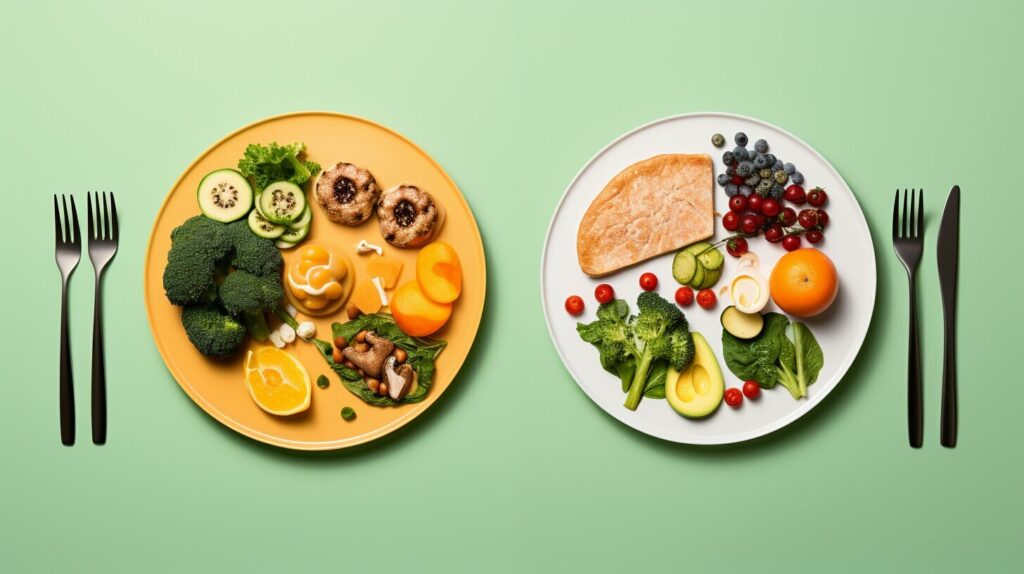Why do I gain weight with my boyfriend?
Have you ever wondered why you tend to gain weight when you’re in a relationship? It’s a common phenomenon that many couples experience, and there are several reasons behind it. From changes in habits and behaviors to the influence of your partner, various factors can contribute to weight gain in relationships.
Surveys show that couples often engage in habits that can lead to weight gain. Whether it’s eating out more frequently, ordering takeout, or adopting a more sedentary lifestyle, these changes in routine can have a significant impact on your waistline. Research has found that couples are more likely to have unhealthy habits and be overweight compared to singles.
If you’ve noticed the number on the scale creeping up since you got together with your partner, don’t worry. In this article, we’ll explore the various factors that contribute to weight gain in relationships and offer tips on how to maintain a healthy lifestyle as a couple.
Key Takeaways:
- Being in a relationship can lead to changes in habits and behaviors that can contribute to weight gain.
- Couples tend to engage in unhealthy habits, such as eating out more frequently and adopting a sedentary lifestyle.
- Alcohol consumption and increased sedentary behavior are also factors that can contribute to weight gain in relationships.
- Prioritizing healthy eating, exercise, and effective communication can help couples maintain a healthy lifestyle together.
- By making small changes and supporting each other’s goals, it’s possible to prevent weight gain and enjoy the benefits of being in a relationship.
The Impact of Abandoned Personal Wellness Routine
When you’re in a relationship, it’s easy to abandon your personal wellness routine and fall into unhealthy habits. One of the main reasons for this is the frequency of eating out. Instead of cooking nutritious meals at home, couples tend to opt for the convenience of restaurant food or takeout. This change in dining habits can have a significant impact on your health and weight.
Eating out more frequently often means consuming more sugar, fat, and sodium. Restaurant dishes are typically higher in calories compared to homemade meals. In fact, studies have shown that couples who eat out more often are more likely to have a less healthy diet overall. The caloric content of these restaurant dishes can contribute to weight gain over time.
“Choosing to eat out regularly while in a relationship can lead to a significant increase in caloric intake, as restaurant menu items are often higher in fat, sugar, and sodium.”
To illustrate the impact of eating out, consider the following table that compares the calorie content of popular homemade dishes with their restaurant counterparts:
| Homemade Dish | Restaurant Dish | |
|---|---|---|
| Grilled Chicken Salad | 350 calories | 600 calories |
| Pasta with Tomato Sauce | 400 calories | 800 calories |
| Grilled Salmon with Brown Rice | 450 calories | 900 calories |
As you can see, even seemingly healthy choices like salads can be significantly higher in calories when ordered at a restaurant. It’s important to be mindful of your food choices and try to incorporate more home-cooked meals into your routine.

Adopting Unhealthy Habits from Your Partner
When you’re in a relationship, it’s common to adopt some of your partner’s habits, including their eating behavior. Whether it’s trying new foods together, eating more frequently, or changing your eating patterns to match theirs, research suggests that eating behavior can be influenced by a new partner. This can lead to a shift in food choices and eating frequency, potentially resulting in weight gain.
It’s important to be aware of the impact that your partner’s eating habits may have on your own health. While it’s natural to want to share experiences and try new things together, it’s essential to maintain a balance and make mindful choices. Communicating openly with your partner about your goals and finding ways to support each other in making healthier choices can help establish a positive and sustainable eating pattern as a couple.
Remember, just because your partner may have unhealthy eating habits doesn’t mean you have to adopt them. You can still enjoy meals together while prioritizing your health by choosing nutritious options and practicing portion control.
Table: Influences on Eating Behavior in Relationships
| Influence | Impact on Eating Behavior |
|---|---|
| Trying new foods together | Expanding food preferences but potentially consuming more calorie-dense foods |
| Eating more frequently | Potentially increasing overall calorie intake |
| Changing eating patterns to match partner | Altering meal timing and frequency, potentially resulting in less balanced meals |
By being aware of these influences and actively making choices that align with your personal health goals, you can navigate the potential pitfalls of adopting unhealthy habits from your partner. Remember, a healthy relationship involves supporting and empowering each other to make mindful choices for your well-being.

The Impact of Alcohol Consumption on Weight Gain
Alcohol consumption can have a significant impact on weight gain in relationships. When indulging in alcoholic beverages, individuals tend to consume increased calories that can contribute to weight gain over time. Research has shown that the consumption of alcohol can lead to an increased appetite and cravings for high-fat foods, further exacerbating the risk of weight gain.
Studies have found that moderate drinking before a meal can result in higher calorie intake as alcohol can stimulate the appetite and lead to overeating. Additionally, alcoholic beverages often contain high amounts of sugar and empty calories, which can contribute to weight gain. It’s important to be mindful of the caloric content of alcoholic drinks and to consume them in moderation.
“Alcohol consumption can be a hidden source of excess calories, and its impact on weight gain should not be underestimated. It’s important to make informed choices and be aware of the potential consequences of excessive alcohol intake.”
Additionally, alcohol can affect sleep quality, which is another factor that can contribute to weight gain. Poor sleep has been linked to hormonal changes that can increase appetite and promote overeating. Therefore, reducing alcohol consumption and prioritizing quality sleep can help prevent weight gain and maintain a healthy lifestyle.
The Impact of Alcohol Consumption on Weight Gain
| Alcohol Consumption | Impact on Weight Gain | |
|---|---|---|
| Increased Calorie Intake | Alcohol stimulates the appetite, leading to overeating. | Alcohol can contribute to weight gain by increasing calorie intake. |
| Cravings for High-Fat Foods | Alcohol consumption can trigger cravings for unhealthy, high-fat foods. | Indulging in high-fat foods can further contribute to weight gain. |
| Disrupted Sleep Patterns | Alcohol can affect sleep quality and disrupt regular sleep patterns. | Poor sleep is associated with hormonal changes that increase appetite. |
By being aware of the potential consequences of alcohol consumption on weight gain, individuals can make more informed choices and take steps to minimize its impact. It’s important to prioritize moderation, consume alcohol responsibly, and maintain a balanced diet and lifestyle to support overall health and well-being.

The Influence of Increased Sedentary Behavior
When we’re in a relationship, it’s common for our activity levels to decrease as we spend more time together. This increase in sedentary behavior can have a significant impact on our overall fitness and contribute to weight gain. Spending hours binge-watching shows or opting to skip exercise in favor of spending quality time with our partners can lead to a decrease in physical activity.
Research has shown that engaging in regular physical activity is essential for maintaining a healthy weight and overall well-being. However, when we prioritize sedentary activities over exercise, we are more likely to experience weight gain and a decline in our fitness levels.
It’s important to find a balance between enjoying quality time with our partners and maintaining a physically active lifestyle. Incorporating physical activity into our shared time together can help counteract the effects of increased sedentary behavior. Consider planning active dates, such as going for a hike, taking a dance class, or going on a bike ride. These activities not only allow us to spend time together but also help us stay active and maintain a healthy lifestyle.

Creating a Fitness Routine
In addition to planning active dates, it can be beneficial to create a fitness routine that both partners can enjoy and commit to. This may involve finding activities that you both enjoy, such as going for a run, taking yoga classes together, or joining a sports league. By making fitness a shared priority, you can support each other’s goals and hold each other accountable.
“Physical activity not only helps to maintain a healthy weight but also has numerous benefits for our mental and emotional well-being.” – Dr. Jane Smith, Fitness Expert
By incorporating regular physical activity into your relationship, you not only improve your physical health but also strengthen your emotional bond. Exercise releases endorphins, which are known as “feel-good” hormones, promoting a positive mood and reducing stress. Making fitness a priority as a couple can contribute to a healthier and happier relationship.
Remember, maintaining an active lifestyle is crucial for overall health and well-being. While it’s natural to spend more time together and engage in sedentary activities in a relationship, it’s important to find a balance and prioritize physical activity. By finding ways to incorporate exercise into your shared time together and creating a fitness routine, you can combat the negative effects of increased sedentary behavior and maintain a healthy weight.
The Impact of Sleep Disturbances on Weight Gain
Sharing a bed with your partner can have unexpected consequences on your weight. Sleep disturbances caused by your partner’s snoring or restless sleep can disrupt your own sleep patterns, leading to hormonal changes that can result in weight gain. Lack of quality sleep affects the hormones responsible for hunger and appetite, increasing your cravings for high-calorie and high-fat foods.
Research has shown that women are more likely to experience sleep issues due to a snoring partner. The hormonal changes caused by sleep disturbances can lead to an increase in appetite, causing you to consume more calories than needed. Additionally, the tiredness and fatigue caused by lack of sleep can make it harder to find the motivation to exercise and make healthy food choices.
To prevent weight gain caused by sleep disturbances, it’s important to prioritize quality sleep. Consider using earplugs or white noise machines to drown out your partner’s snoring. If necessary, explore alternative sleeping arrangements, such as separate beds or bedrooms, to ensure that both you and your partner get a good night’s sleep. Creating a calm and comfortable sleep environment can also contribute to better sleep quality.
By prioritizing quality sleep, you can mitigate the impact of sleep disturbances on weight gain. Remember, a healthy and well-rested body is better equipped to maintain a healthy weight and make mindful food choices.

Sleep Disturbances and Weight Gain: Tips for Better Sleep
Here are some tips to improve your sleep quality and reduce the risk of weight gain:
- Establish a bedtime routine: Create a relaxing routine before bed to signal to your body that it’s time to sleep. This can include activities such as reading a book, taking a warm bath, or practicing relaxation techniques.
- Create a sleep-friendly environment: Ensure that your bedroom is cool, dark, and quiet. Use blackout curtains, earplugs, or a sleep mask if needed.
- Avoid caffeine and electronics before bed: Limit your intake of caffeine in the afternoon and avoid using electronic devices, such as smartphones and tablets, at least an hour before bed. The blue light emitted by these devices can disrupt your sleep-wake cycle.
- Manage stress: Find healthy ways to manage stress, such as practicing mindfulness or engaging in activities you enjoy. Stress can interfere with sleep quality.
- Stick to a consistent sleep schedule: Try to go to bed and wake up at the same time every day, even on weekends. This helps regulate your body’s internal clock and promotes better sleep.
By implementing these strategies, you can improve your sleep quality, reduce the impact of sleep disturbances on weight gain, and support overall health and well-being.
Getting Back on Track with Healthy Habits
After noticing weight gain in your relationship, it’s important to take proactive steps to get back on track with healthy habits. By prioritizing healthy eating and maintaining an exercise routine, you can make positive changes and prevent further weight gain.
One effective strategy is to start small and set achievable goals. Begin by incorporating more fruits, vegetables, and whole grains into your diet. Aim to cook meals at home more often, as this allows you to control the ingredients and portion sizes. Remember, consistency is key.
In addition to healthy eating, don’t neglect the importance of exercise. Find physical activities that you and your partner enjoy, such as going for walks, trying new workout classes, or playing a sport together. By making exercise a regular part of your routine, you’ll not only burn calories but also strengthen your bond as a couple.
To stay motivated, it can be helpful to track your progress and celebrate small milestones along the way. Consider using a fitness app or journal to record your meals, workouts, and achievements. Accountability and support can go a long way in maintaining healthy habits.
| Benefits of Getting Back on Track | How to Incorporate Healthy Habits |
|---|---|
| Improved energy levels | Set realistic goals for healthy eating |
| Increased confidence and self-esteem | Cook meals at home to control ingredients |
| Better quality sleep | Find enjoyable physical activities together |
| Reduced risk of chronic diseases | Track progress and celebrate milestones |
Remember, getting back on track with healthy habits is a journey, and it’s important to be patient with yourself and your partner. Support each other’s efforts and communicate openly about your goals and challenges. By working together, you can create a healthy and happy lifestyle that benefits both of you.
Cooking Healthy Meals Together for Date Nights
When it comes to date nights, why not switch things up and try cooking healthy meals together? Not only does this allow you to spend quality time with your partner, but it also gives you control over the ingredients and ensures you’re making nutritious choices. Plus, cooking together can be a fun and interactive activity that strengthens your bond.
Meal prepping is a great way to make cooking healthy meals together easier and more efficient. Plan your meals in advance and set aside time to prep ingredients or even cook a few dishes ahead of time. This way, you can enjoy a home-cooked dinner together without the stress of cooking from scratch after a long day.
To make your cooking sessions even more enjoyable, try experimenting with new recipes or cuisines. Explore healthier alternatives to your favorite dishes. For example, swap out refined grains for whole grains, use lean proteins like fish or poultry, and incorporate plenty of fruits and vegetables into your meals. Get creative and have fun with it!
Tips for Cooking Healthy Meals Together
- Plan your meals and create a shopping list together.
- Divide tasks in the kitchen to make the process more efficient.
- Experiment with herbs, spices, and seasonings to add flavor without adding excess salt or sugar.
- Try new cooking techniques like grilling, roasting, or steaming for healthier results.
- Make it a habit to eat together at the dining table, focusing on each other and enjoying the meal.
By cooking healthy meals together, you not only prioritize your health but also create lasting memories with your partner. So, next time you’re planning a date night, put on your aprons, turn on some music, and enjoy the process of cooking a delicious and nutritious meal together.

Table: Health Benefits of Cooking Healthy Meals Together
| Benefit | Explanation |
|---|---|
| Control over ingredients | By cooking at home, you have control over the quality and quantity of ingredients, making it easier to choose healthier options. |
| Better nutritional value | Home-cooked meals tend to be more nutrient-dense compared to restaurant or takeout options, leading to improved overall health. |
| Portion control | Cooking together allows you to portion your meals appropriately, preventing overeating and aiding in weight management. |
| Increased variety | Exploring new recipes and cuisines helps you incorporate a wider range of nutrient-rich foods into your diet. |
| Strengthened bond | Cooking together fosters teamwork, communication, and creates shared memories that enhance your relationship. |
Maintaining Fitness Regimen as a Couple
Staying active together as a couple is not only a great way to maintain a healthy lifestyle but also a fantastic bonding experience. By finding a shared fitness routine, you can support each other’s goals and strengthen your relationship while taking care of your physical well-being. Whether you enjoy outdoor activities, hitting the gym, or trying new fitness classes, there are plenty of opportunities to stay active as a couple.
One way to incorporate physical activity into your time together is by planning active dates. Instead of going out for a traditional dinner or movie, opt for activities like hiking, biking, or taking a dance class. These types of activities not only provide exercise but also allow you to explore new places and create lasting memories.

Exercising together can also help to motivate and encourage each other. By setting fitness goals as a couple and working towards them together, you can provide support and accountability. Whether you’re aiming to run a 5K, complete a workout challenge, or simply improve your fitness levels, having a partner by your side can make the journey more enjoyable and successful.
Benefits of Exercising as a Couple
- Increased motivation and accountability
- Strengthened emotional bond
- Shared goals and accomplishments
- Improved communication and teamwork
- Enhanced physical and mental well-being
Remember, maintaining a fitness regimen as a couple doesn’t mean you have to do everything together. It’s important to respect each other’s individual preferences and fitness levels. Find a balance between shared activities and pursuing personal fitness interests. By supporting each other’s choices and finding a routine that works for both of you, you can maintain a healthy lifestyle as a couple.
Making Healthier Choices When Dining Out
When it comes to dining out, making healthier choices is essential for maintaining a healthy lifestyle. Choosing restaurants that offer healthy options can make a significant difference in managing your weight and overall well-being. By planning ahead and being mindful of your choices, you can enjoy a delicious meal while still prioritizing your health.
One effective strategy is to look at the menu beforehand. Many restaurants now provide their menus online, allowing you to review the options and identify healthier alternatives. This helps you make informed decisions and avoid impulsive choices that may be high in calories, unhealthy fats, or added sugars.
Additionally, when dining out, it’s essential to pay attention to portion sizes. Restaurants often serve larger portions than what is necessary, leading to overeating and potential weight gain. Consider sharing a meal with your partner or opting for the smaller portion sizes offered, if available. This way, you can enjoy the dining experience together without overindulging.
Another tip for making healthier choices when dining out is to prioritize vegetables, lean proteins, and whole grains. These nutritious options provide essential nutrients and are generally lower in calories. Look for dishes that include grilled or steamed vegetables, lean cuts of meat or fish, and whole grain, high-fiber side dishes. Remember to be cautious of high-calorie dressings, sauces, or toppings that can add unnecessary calories to your meal.

Benefits of Making Healthier Choices When Dining Out
- Supports weight management and prevents weight gain
- Provides essential nutrients for overall health
- Reduces the risk of chronic diseases, such as heart disease and diabetes
- Improves energy levels and overall well-being
“Choosing healthier options when dining out allows you to enjoy delicious meals while still prioritizing your health and well-being.”
By making conscious decisions when dining out, you can maintain a healthy lifestyle and enjoy the social aspect of eating out with your partner. Remember, it’s the small choices that add up, so take control of your dining experience and make choices that align with your health goals.
Encouraging Healthy Eating Habits for Your Partner
If you’ve noticed that your partner has unhealthy eating habits, there are several ways you can encourage them to make healthier choices. By leading by example and incorporating healthy foods into your meals, you can positively influence their eating habits. Here are some strategies to consider:
- Introduce alternative ingredients: Incorporate healthier alternatives into your meals, such as using whole grain pasta instead of white pasta or swapping out sugary beverages for infused water.
- Cook together: Make meal preparation a joint effort by cooking healthy meals together. This not only strengthens your bond but also allows you to control the ingredients and portion sizes of the dishes you consume.
- Offer healthy options: Keep your fridge and pantry stocked with nutritious foods. By making healthier options readily available, your partner will be more likely to choose them when they’re hungry.
- Provide education and resources: Share articles, recipes, or documentaries about the benefits of healthy eating. This can help your partner understand the importance of making better food choices and empower them to take control of their own health.
Remember, it’s important to approach these conversations with kindness and understanding. Focus on the positive aspects of making healthier choices and the benefits it can bring to both of you. By creating a supportive and encouraging environment, you can help your partner develop healthier eating habits that contribute to their overall well-being.
“The food you eat can be either the safest and most powerful form of medicine or the slowest form of poison.” – Ann Wigmore
Encouraging healthy eating habits for your partner can be a journey that requires patience and persistence. By implementing these strategies and providing support along the way, you can make a positive impact on their dietary choices and promote a healthier lifestyle for both of you.
| Benefits of Encouraging Healthy Eating | Ways to Encourage Healthy Eating |
|---|---|
| Improved energy levels | Introduce alternative ingredients |
| Weight management | Cook together |
| Reduced risk of chronic diseases | Offer healthy options |
| Enhanced mood and mental well-being | Provide education and resources |
Conclusion
Weight gain in relationships is a common phenomenon influenced by various factors such as changes in habits, lifestyle, and behaviors. However, it’s possible to maintain healthy habits and prevent weight gain as a couple. Effective communication, support, and a shared commitment to health can help couples navigate the challenges of maintaining a healthy lifestyle together.
One key aspect is maintaining open and honest communication about health goals and concerns. By discussing the impact of certain habits and behaviors on weight gain, couples can work together to make informed decisions and support each other’s goals. From meal planning to finding enjoyable physical activities, collaboration is vital in maintaining healthy habits as a couple.
Supporting each other’s goals is also crucial. By sharing the responsibility of staying healthy, couples can motivate and encourage one another. This can involve joining fitness classes together, preparing nutritious meals as a team, or even exploring new hobbies that require physical exertion. Celebrating milestones and small victories along the way can help strengthen the bond between partners and reinforce their commitment to a healthy lifestyle.
In conclusion, being in a relationship doesn’t have to result in weight gain. By prioritizing communication, supporting each other’s goals, and maintaining healthy habits, couples can navigate the challenges and enjoy a balanced and fulfilling lifestyle together. Remember, it’s important to prioritize your health and well-being while enjoying the joys of being in a relationship.
FAQ
Why do I gain weight with my boyfriend?
Being in a relationship can lead to weight gain due to changes in habits and behaviors. Couples may eat out more frequently, order takeout, and adopt more sedentary lifestyles, leading to unhealthy habits and higher chances of being overweight compared to singles.
What is the impact of abandoning my personal wellness routine?
When you’re in a relationship, you may abandon your personal wellness routine, such as eating at home and bringing your own lunch to work. Eating out more frequently can result in consuming more sugar, fat, and sodium, as restaurant dishes tend to be more caloric. Studies have shown that couples who eat out more often have less healthy diets.
How does adopting unhealthy habits from my partner affect weight gain?
Being in a relationship can lead to adopting your partner’s unhealthy eating habits. You may try new foods, eat more frequently, or eat later in the day to match their eating patterns. Research suggests that eating behavior can be influenced by a new partner, leading to changes in food choices and eating frequency.
What is the impact of alcohol consumption on weight gain?
Going on dates often involves consuming alcohol, which can contribute to weight gain. Moderate drinking before a meal can increase calorie intake and lead to cravings for high-fat foods. It’s important to be mindful of alcohol consumption and stick to recommended limits to avoid excessive calorie intake.
What is the influence of increased sedentary behavior?
Spending more time together can lead to increased sedentary behavior. Binge-watching shows and skipping exercise to spend time with your partner can result in decreased physical activity. It’s important to find a balance between quality time and staying active to prevent weight gain.
How do sleep disturbances contribute to weight gain?
Sharing a bed with your partner can lead to sleep disturbances, which can increase the risk of weight gain. Lack of sleep has been linked to hormonal changes that affect hunger and appetite. Prioritizing quality sleep can help prevent weight gain.
How can I get back on track with healthy habits?
If you’ve noticed weight gain in your relationship, it’s important to get back on track with healthy habits. Focus on reestablishing your personal wellness routine, including healthy eating and regular exercise. Even small changes can make a big difference in how you feel.
How can I cook healthy meals together for date nights?
Instead of going out for dinner, try cooking healthy meals together for date nights. This way, you can still enjoy a meal together while knowing exactly what you’re eating. Research has shown that people who cook dinner most days consume fewer calories and less fat and sugar compared to those who eat out frequently.
How can I maintain a fitness regimen as a couple?
Find ways to incorporate physical activity into your time together as a couple. Plan active dates such as hikes or bike rides. Research has found that when one partner takes initiative to improve their health, the other is more likely to follow suit. Prioritizing fitness as a couple can help maintain a healthy lifestyle.
How can I make healthier choices when dining out?
When dining out, choose restaurants that offer healthier options on their menu. Look at the menu beforehand to plan ahead and make healthier choices. Research has shown that having a plan in place and being aware of healthier options can help in making better food choices when dining out.
How can I encourage healthy eating habits for my partner?
If your partner has unhealthy eating habits, encourage them to make healthier choices. Find creative ways to incorporate healthy foods into your meals, such as using alternative ingredients or preparing dishes in a healthier way. An increased exposure to healthy eating can positively influence your partner’s habits.
What is the importance of maintaining healthy habits in relationships?
Weight gain in relationships is a common phenomenon influenced by various factors such as changes in habits, lifestyle, and behaviors. However, it’s possible to maintain healthy habits and prevent weight gain as a couple. Effective communication, support, and a shared commitment to health can help couples navigate the challenges of maintaining a healthy lifestyle together. Remember, it’s important to prioritize your health and well-being while enjoying the joys of being in a relationship.






